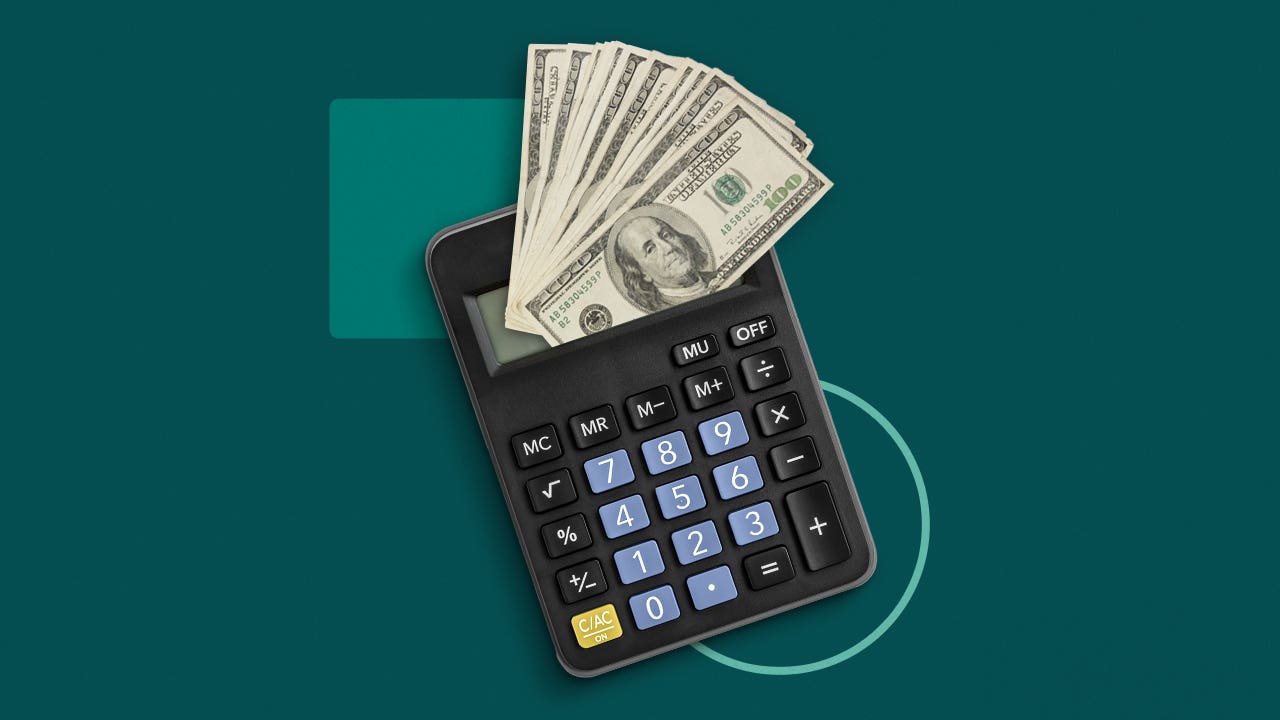How to calculate interest on a loan




Key takeaways
- Lenders calculate how much interest you’ll pay with each payment in two main ways: simple or on an amortization schedule.
- Short-term loans often have simple interest.
- Larger loans, like mortgages, personal loans and most auto loans, have an amortization schedule.
- The difference between the two is in how interest is applied to the principal amount.
Lenders charge interest in two ways – either simple or on an amortization schedule. The way you calculate total interest charges will differ between the two accrual types. While you can use a calculator, understanding the mechanics makes you a better-informed borrower.
Terms to know
- Simple interest loan
-
A loan where the interest for each payment stays the same for the loan’s lifetime.
- Amortization
-
Amortization is a gradual loan repayment process where you have a fixed payment, but you pay higher interest in the beginning and less toward the end.
- Interest
-
The fee a lender charges you for borrowing money.
- Principal balance
-
The amount you originally borrowed.
How to calculate simple interest on a loan
Simple interest is most commonly used for short-term loans – like payday loans, or some types of personal or auto loans. It’s the easiest to understand and calculate. Those with student loans may also pay simple interest. For instance, all federal student loans charge simple interest.
Formula for calculating simple interest
- Principal loan amount x Interest rate x Loan term in years = Interest
The monthly payment is fixed, but the interest you’ll pay each month is based on the outstanding principal balance. “Interest fluctuates with the principal balance,” says Bankrate senior loans editor Rhys Subitch. “Making a payment five days late means five days where your principal balance was higher, and thus, more interest would be charged.”
Borrowers who make on-time or early payments benefit from simple interest. If you pay the loan off early, you could save a lot of money in interest, assuming the lender doesn’t charge a prepayment penalty.
If you're going to make extra loan payments, ask for the payments to be applied to the principal balance. If you don't specify, the lender may not apply the payment in a way that nets you the most savings – it's there to make money, after all.— Rhys Subitch, Bankrate senior editor, Loans
This structure gives borrowers more transparency and predictability – you know exactly how much interest you’ll owe if you follow your repayment plan or pay ahead. Because interest is calculated based only on the loan principal, borrowers can save more with these loans than with those with compound interest.
“Personal loans don’t typically use compound interest,” says Subitch. “Instead, simple interest is the most common form of interest accrual. Compound interest is more often used with revolving credit, like credit cards.”
How to calculate amortizing interest on a loan
Calculating interest on an amortized loan involves a few steps. While you can do the math manually, using an amortization calculator can simplify the process and show your full repayment schedule automatically.
Calculating amortized interest manually
- Divide your interest rate by the number of payments you’ll make that year. If you have a 6 percent interest rate and you make monthly payments, you would divide 0.06 by 12 to get 0.005.
- Multiply that number by your remaining loan balance to find out how much you’ll pay in interest that month. If you have a $5,000 loan balance, your first month of interest would be $25.
- Subtract that interest from your fixed monthly payment to see how much principal you will pay in the first month. If your lender has told you that your fixed monthly payment is $430.33, you will pay $405.33 toward the principal for the first month. That amount gets subtracted from your outstanding balance.
- Repeat the process with your new remaining loan balance for the following month, and continue repeating for each subsequent month. To get the total interest, add all the interest payments together.
The main difference between amortizing loans and simple interest loans is that the initial payments for amortizing loans are generally interest-heavy. That means a smaller portion of your monthly payment goes toward your principal. As time passes, and you draw closer to your loan payoff date, the table turns – the lender applies most of your monthly payments to your principal balance and less toward interest fees.
Bankrate’s take: Lenders typically benefit from amortized interest. Because these loans tend to have longer terms, your total interest paid is higher. Plus, you save less if you pay off the loan early, since your interest payments are frontloaded.
Many lenders charge interest based on an amortization schedule. According to Subitch, amortization schedules look at your loan in its entirety “from the time you sign to the day it’s scheduled to be paid off.” This schedule breaks down each payment and shows how much goes toward principal and interest, giving you “a full understanding of where your payments are going and when to effectively plan an early payoff strategy.”
Many types of installment loans use amortized interest, including mortgages, most auto loans, debt consolidation loans and even some home equity loans. The monthly payment on these loans is fixed – the loan is paid over time in equal installments – but how the lender charges interest changes over time.
Here’s an example of an amortization schedule for a $5,000, one-year personal loan with a 12.58 percent interest rate, the average interest rate on personal loans in August 2025.
| Payment Date | Payment | Principal | Interest | Total Interest | Balance |
|---|---|---|---|---|---|
| Sep 2025 | $445.60 | $393.19 | $52.42 | $52.42 | $4,606.81 |
| Oct 2025 | $445.60 | $397.31 | $48.29 | $100.71 | $4,209.51 |
| Nov 2025 | $445.60 | $401.47 | $44.13 | $144.84 | $3,808.04 |
| Dec 2025 | $445.60 | $405.68 | $39.92 | $184.76 | $3,402.36 |
| Jan 2026 | $445.60 | $409.93 | $35.67 | $220.43 | $2,992.42 |
| Feb 2026 | $445.60 | $414.23 | $31.37 | $251.80 | $2,578.19 |
| Mar 2026 | $445.60 | $418.57 | $27.03 | $278.83 | $2,159.62 |
| Apr 2026 | $445.60 | $422.96 | $22.64 | $301.47 | $1,736.65 |
| May 2026 | $445.60 | $427.40 | $18.21 | $319.67 | $1,309.26 |
| Jun 2026 | $445.60 | $431.88 | $13.73 | $333.40 | $877.38 |
| Jul 2026 | $445.60 | $436.40 | $9.20 | $342.60 | $440.98 |
| Aug 2026 | $445.60 | $440.98 | $4.62 | $347.22 | $0.00 |
6 Factors that can affect how much interest you pay
Several factors can affect how much interest you pay for financing. Some key variables include:and
- Loan amount: The more money you borrow, the more interest you’ll pay. This is because interest is typically calculated as a percentage of the loan balance.
- Interest rate: Your interest rate is the biggest driver of loan cost. Even a 1-2 percent difference can add hundreds of dollars over the life of the loan. Always shop around for the best personal loan rates before applying.
- Credit score: Lenders use your credit score to assess risk. Higher scores unlock lower interest rates, while lower scores may result in significantly higher borrowing costs.
- Loan term: Shorter terms usually mean higher monthly payments but lower total interest paid. Longer terms stretch out repayment and often result in more interest paid overall.
- Repayment frequency: Making payments more frequently, such as biweekly instead of monthly, can help reduce your principal faster, which cuts down on interest charges.
- Extra payments: Paying more than the minimum, especially early in the loan term, can reduce your principal and save money on interest. Just make sure your lender applies the extra amount directly to your principal balance.
Help us shape the future of personal finance
We’re building something new to make rate shopping smarter and simpler. Join our waitlist to get early access, share your feedback, and unlock exclusive offers.
Priority rate alerts
Exclusive member offers
Time saving
Limited spots remaining
You're signed up!
Now, help us personalize your experience. Answering the next few questions will ensure you receive the most relevant tips and offers.
What are you looking for?
Tell us which products you are in the market for
What do you already have?
Tell us which products you already have
Tell us a bit more about you.
Are you a homeowner?
Tell us about your financial situation
What is your FICO credit score
One more thing
What is your annual income?
Stay tuned to see what we're building
You're all set! We're gearing up to share something big. You'll hear from us soon with what's next.
How to get the best loan interest rates
You may be able to improve your chances of obtaining the most favorable interest rate on a loan in a few ways:
- Improve your credit score: The most competitive interest rates are generally available to those with good to excellent credit.
- Opt for a shorter repayment timeline: The best interest rates will always accompany the shortest-term loans. You will pay less interest over time if you can afford the payments.
- Reduce your debt-to-income ratio: Your debt-to-income (DTI) ratio is the monthly debt you pay as a percentage of your gross monthly income. It is nearly as significant as your credit score when qualifying for a competitive loan.
- Compare offers. Loans aren’t a one-size-fits-all type of product — each lender has its own offering. Prequalify with at least three different lenders to ensure you get the best rates. Prequalifying allows you to see the terms and interest rates available to you with a specific lender without hurting your credit.
Bottom line
Before taking out a loan, it’s vital to calculate how much you’ll pay in interest to understand the true borrowing costs. Ask the lender if interest is assessed using the simple interest formula or an amortization schedule. Then, use the appropriate formula or an online calculator to run the numbers.
Also, be mindful of the factors that will affect the interest you pay. It may be worthwhile to borrow less or shorten the repayment term to keep more of your hard-earned money in your pocket.
Why we ask for feedback Your feedback helps us improve our content and services. It takes less than a minute to complete.
Your responses are anonymous and will only be used for improving our website.





